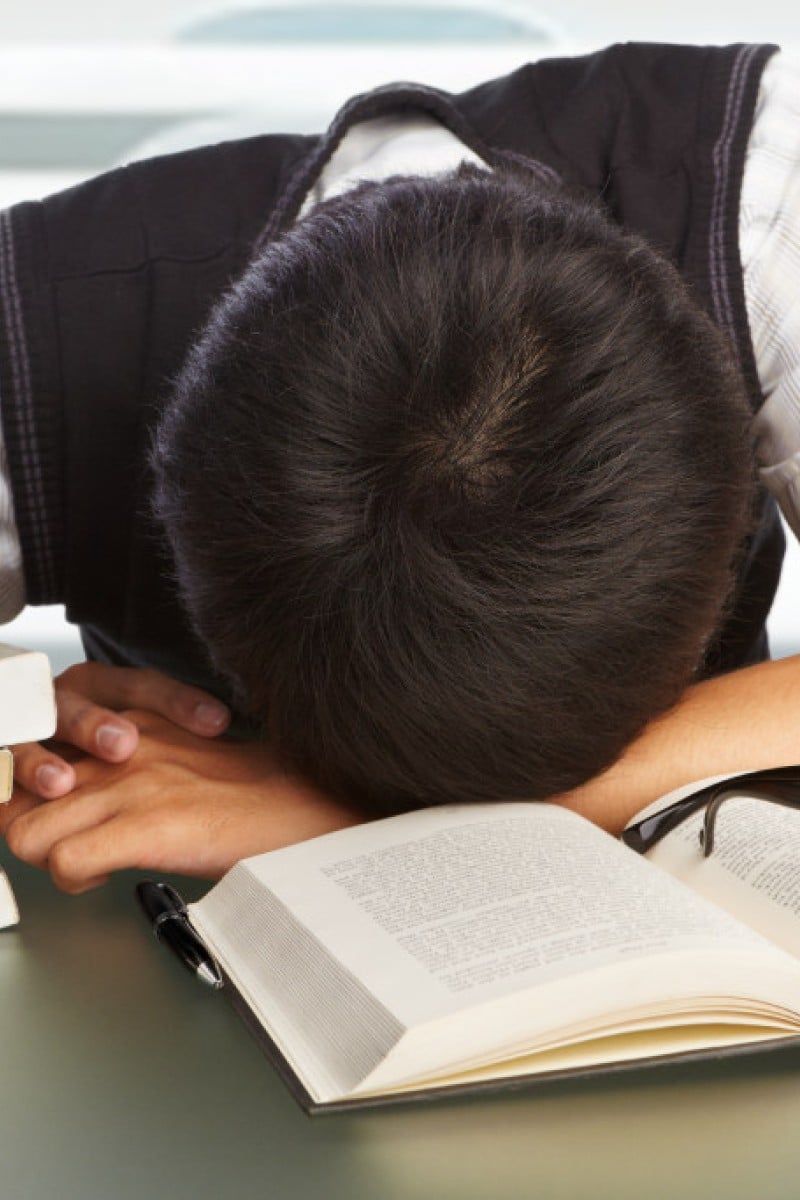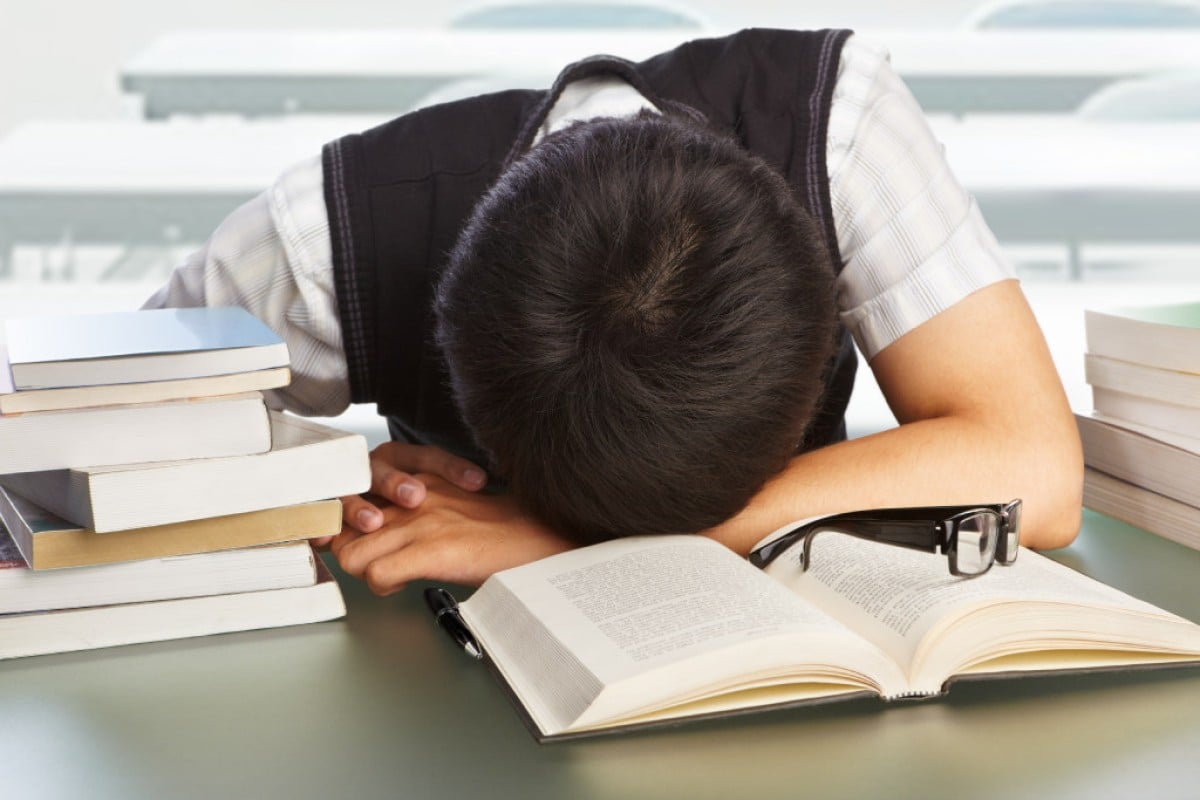
Suicide rate and mental health illness among HK students are rising, educators and counsellors should pay attention
Study shows suicide rates for full-time students increased 76 per cent between 2012 and 2016

At Chinese University, students unload their heartaches and exam stress by “whispering” confessions into a tree hole, albeit a digital one on Facebook.
The premise for the Tree Hole social media page is simple. It calls on students from the university to “share what’s on their mind” anonymously and at any hour, just by filling out a form and clicking submit.
It is run by a student group and serves as a tool to forge dialogue on mental health, as well as being part of a campuswide effort to improve students’ psychological well-being. The move comes against a backdrop of rising suicide rates among students.
Resilient, anxious or avoidant: which stress type are you, and how do you deal with problems?
“The idea is that you can say anything into a tree hole,” says Simba Lee, a second-year student and one of the members of the peer counselling group that runs the page. “It keeps your secrets.”
But this tree hole speaks back.
Below the online submissions are replies of the uBuddies, university students like Lee who are trained as peer mental health counsellors.
The page has received hundreds of messages over the past year, especially in the weeks leading up to final exams, when stress runs high.
The posts are often confessions of loneliness, testimonies to falling into deep ruts of academic stress, or raw statements about what’s going on at home – a mother’s illness, a quarrel with a father – typed out for lack of a confidant or because it is just easier to offload this way.
The replies by uBuddies are sprinkled with emojis and encouragement, and take a similar structure: first, letting the writer know their story has been heard, and then, providing information on how to get in touch with professional counsellors in the school.
This year, the group received university funding to train an additional 20 members in peer counselling, on top of their annual crop of 50 recruits.
1 in 7 HK students from poor families ‘overloaded with stress’
This effort is not unique to Chinese University. Mental health has become a hot topic in Hong Kong’s education system at various levels, as school officials – and students themselves – look to push back against rising rates of suicide and mental illness among the city’s youth.
Time to pay attention
There is real need for schools to pay attention, according to Paul Yip Siu-fai, founding director of the Centre for Suicide Research and Prevention at the University of Hong Kong (HKU), who says that the city has seen a rise in youth suicide rates, especially among students enrolled in academic programmes.
“When we are looking at the suicide rate for the past 10 years or so, in every age group the number has come down, except for young people aged 15 to 24,” Yip says.
Students are disproportionately pushing this figure up. The suicide rate for young people not enrolled in schools, who are typically considered the group with the higher risk, has remained stable in Hong Kong.
In contrast, suicide rates for full-time students increased 76 per cent between 2012 and 2016, according to the most recent official data collected by the centre.
Of the 75 youth suicides in 2016, 29 were presumed to be full-time students.
Half of Hong Kong students and teachers show signs of depression due to stress of school workload
“Usually if you are in school, it’s supposed to be a good thing – you have protection, and these students who go to university are the survivors of the academic system, the top percentile who can go to funded places in university,” Yip says.
Alongside such tragedies, some of which have occurred across Hong Kong campuses in recent years, are indications that mental health among Hong Kong’s university students is deteriorating.
More than two-thirds of students in the city’s eight publicly funded universities experience mild to severe depressive symptoms, while more than half have anxiety symptoms, according to a survey of more than 1,000 students published in September in the Hong Kong Medicine Journal.
These results differ from a study conducted in 2006. That research found only 21 per cent of first-year university students had depressive signs; anxiety symptoms were more comparable, impacting 41 per cent of students, 13 per cent less than recent figures.
Lower your stress with simple hand reflexology you can do at anytime
“Young people are not only suffering from academic stress, but also relationship and adjustment problems. Family support is not as strong as it was before, so they may have no one to turn to,” Yip says, adding that social media may also create a disconnect between peers as young people “hide behind computer screens”.
Such findings among the city’s youth corresponds to the population in general, as an annual government-led survey found that adult mental health hit a seven-year low in 2018.
“Hong Kong is very competitive, the atmosphere is like you need to be rich, you need to buy a house, you need to be successful,” says Lee, the uBuddies peer counsellor.
5 ASMR artists to help you relax
“My friends worry that if they don’t have high grades, then after graduation they can’t get a good job, so they are so stressed out if they do not get an ‘A’.”
His fellow peer counsellor Karen Lo agrees. She says she often observes students obsessing about potential failure the moment they finish an exam, even when their obsessing has no foundation. “They say they knew how to do [the exam], but they worry anyway.”
Despite these common academic and social worries, opening up about anxiety, stress and other problems can be difficult on campus, the uBuddies say, as students may feel that others will judge them or just don’t have time to listen.
“Sometimes students or people don't talk because they think no one is listening,” Lo says, pointing out that this can be dangerous. “We will tell ourselves to be strong, and we ignore our negative feelings, until these accumulate and finally explode.”
Showing that there is someone who cares, whether it is on the other side of a Facebook page or, more importantly, by fostering an atmosphere in which peers feel more comfortable talking and listening to each other, is crucial to countering mental stress on campus and preventing suicide, the group says.
Remembering a student suicide which occurred on campus the previous year, fellow counsellor Aijuan Foong says: “I felt quite sad, because I think that those who have died by suicide, they didn’t really want to, they just didn’t have a way to get over the obstacles and they couldn’t handle it any more.”
A cluster of student suicides that hit Hong Kong universities and secondary schools in the 2015-2016 academic year pushed more educators to pay more attention to students’ mental stress and wellness, according to Dr Linda Yeung, director of the Counselling and Person Enrichment (CoPE) services at the University of Hong Kong. Experts have also attributed suicide spates to students hearing about other cases.
This is why life feels too much sometimes and what you can do to help yourself feel better
“That sounded an alarm, and since then everyone is talking about mental health and suicide prevention,” Yeung says.
At the primary and secondary school level, this meant more resources directed towards mental health.
Stemming a dark tide
The Education Bureau launched a task force in 2016, led by Yip of the Centre for Suicide Research and Prevention, to research and make recommendations on how to promote mental health in public schools and prevent suicide.
Changes in the subsequent school years have included more resources for schools to hire social workers, access to grants of up to HK$200,000 for projects to enhance student well-being, and training for primary and secondary schoolteachers to support students with mental illness and identify suicide risks.
A coalition of government bureaus headed by the secretary for labour and welfare submitted an additional report evaluating recommendations and laying out further steps to the chief executive in October this year.
At the university level, administrators have looked for ways to enhance a positive campus culture to combat mental illness.
For Yeung, who leads HKU’s counselling services, looking out for the school’s 30,000 students with a counselling team of 10 means engaging the whole community to support each other, from residential hall tutors to teachers, and training students to know how to talk to their troubled peers.
Some 100 HKU students and 50 teachers each year go through a “Mental Health First Aid Training”, an international programme that the uBuddies also complete as part of their training on campus.
Students learn how to recognise warning signs of mental illness, start conversations and respond when peers need help, especially if they do not want to see a counsellor.
“At that imperative time, friends are very important,” Yeung says.
But Yeung adds that, during her 12 years providing counselling services at HKU, she has seen attitudes towards counselling change. “People are less resistant to seeking help in recent years. They don’t feel too ashamed in disclosing they have an issue.”
How stretching everyday can benefit your physical and mental health
While the stigma is “less obvious” than in the past, some students are still concerned about how others may judge them, and may even self-stigmatise, according to Yeung.
As for the uBuddies, they say that even though their campus has become more open-minded, prevailing attitudes in Hong Kong still stigmatise mental illness and cast sufferers in a negative light, turning them into pariahs in society.
Lee says he has had to alter some of his preconceptions during training. Now he feels strongly that pushing back against this stigma and raising awareness on mental wellness can start with simple conversations.
“The most important thing is attitude, Lee adds. “It’s about having an attitude to just listen to what others have to say and not judge.”
If you, or someone you know, are having suicidal thoughts, help is available. For Hong Kong, dial +852 2896 0000 for The Samaritans or +852 2382 0000 for Suicide Prevention Services.
